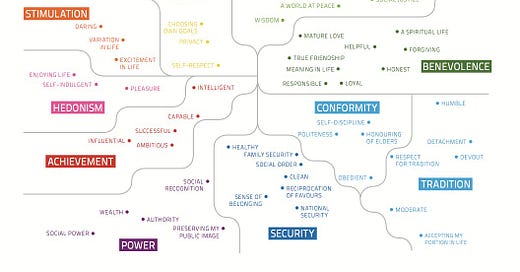Values are the “moral, social, or aesthetic principles that individuals, groups, and societies use as a guide to what is good, desirable, or important” (APA Dictionary of Psychology). They are the standards we use to prioritize things in our lives like people, activities, behaviors, and work environments.
Values tend to be relatively stable over the course of a lifetime, they tend to solidify along with personality and interests in the early to mid 20s, and they can (and do) change over time, frequently when we're undergoing major life events (e.g., first job, marriage, birth of a child, death of a parent, etc.).
Values are competitive.
In 1987, the social psychologist Shalom Schwartz published his first study on what would become the somewhat grandiose sounding “Theory of Basic Human Values.” Across many replications and a prolific span of research, Schwartz’s theory has proven to be incredibly robust and useful. It describes 10 categories of values that show up consistently across cultures and that shape motivations from the individual level all the way to the societal level.
Values tend to be relatively easy to measure, similar to interests, because they operate at an almost gustatory level: “I like this, I don’t like that”; “I value this, I don’t value that.” It is a response so basic, so fundamental, that it operates at the amoebic level.
One of the most common ways of assessing values is through a method called a “values sort.” This involves sifting through a stack of cards, each of which describes a single value, and making comparisons until you have 1 (or 2 or 3) that you can identify as your highest values. People can usually do this quite quickly and with relative ease until they get down to the final few. It’s those final few values…the ones we tend to hold as inviolable, those are the ones that tend to war within us.
Schwartz’s provides some insight as to why.
The values that are closer together in the model tend to be more similar and mutually reinforcing, while those that are farther apart tend to exist in more tension with each other. So, for example, if your highest values are Benevolence-oriented, they will necessarily compete with your Achievement-oriented values. Or, in a work setting, what you might think of as the tension between managing relationships and getting things done.
Another example - I may enjoy the comfort of a tight knit community that is highly reverent of tradition, while also desiring freedom and autonomy and self-expression. I may value doing work that allows me to provide financial security for my family, while also valuing the pursuit of work that is less lucrative but perhaps more inline with my calling.
What do we do when these values conflict with each other? When we're presented with two opportunities, each of which appeals to a different core value; or when work or family demands the same time slot and we're forced to make a choice? How do we decide what takes priority?
It is a challenge to live our values out with the same verve with which we can express them. Sometimes what we say we value, what we think we value (...what we desperately want to value), is in fact not what brings us joy, or contentment, or happiness, or flourishing, or [insert your favorite positive psych outcome here].
And I don't think that single-minded focus on one value is the goal either, that's the realm of monks and zealots. I think the tension between the values can be productive. Finding the balance between building relationships and getting things done is ultimately the central challenge of what it means to work in an organization, to coordinate with other people for a common goal.
Some of our values are more distant and abstract to our daily lives, while others may shape most of our waking moments. When big decisions highlight these tensions, it can be helpful to mentally shift between different levels of thinking, weighing the practical, strategic, and existential implications of a certain course of action.
How does prioritizing this value impact my day-to-day life (or does it)? How might it impact my long-term goals/interests and my ability to achieve them? And how will it shape my perception of who I am and who I want to become?





